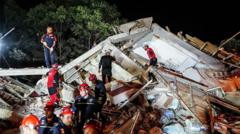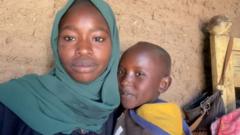**The earthquake that struck Myanmar has added to the humanitarian crisis, raising concerns over the military government's restrictions on relief efforts.**
## Humanitarian Crisis in Myanmar: Earthquake Relief Stalled

## Humanitarian Crisis in Myanmar: Earthquake Relief Stalled
**Recent earthquakes have left regions of Myanmar and Thailand devastated, with international aid efforts hindered by political challenges.**
Despite an international appeal for help following a destructive earthquake on March 28, Myanmar's military government is reportedly obstructing the delivery of aid, leaving many victims without necessary support.
Rescue and relief efforts faced significant delays, as highlighted by accounts from French volunteers who arrived equipped with essential tools but were stranded at Yangon’s immigration for over a day before being informed that search and rescue operations were concluding. Authorized to proceed only after this extended wait, the volunteers returned home empty-handed, having not located any survivors.
Observers were initially surprised when the Myanmar military government called for outside assistance in the wake of the earthquake and temporarily declared a cease-fire amid ongoing civil conflict. Yet, as the situation unfolded, aid groups revealed that relief efforts were not being executed as efficiently as they could have been due to government-imposed delays and restrictions. Moreover, a pervasive atmosphere of fear looms over the areas affected, as military factions continue their attacks on rebel territories, which include instances of violence against aid workers.
With the official death toll exceeding 3,500 and many more casualties likely unaccounted for due to damaged infrastructures, the extent of the devastation remains largely unquantifiable. According to volunteer Sezer Ozgan from the nonprofit L’Espoir du peuple A.R.S.I, the on-ground conditions have proven to be unmanageable, complicating the arduous task of delivering timely assistance to those in dire need.
As the nation grapples with the dual crises of natural disaster and political turmoil, consideration must be given to how these challenges can be addressed in order to expedite crucial aid and alleviate the suffering of the Myanmar populace. "Earth's anger," as many local residents have termed the quake, presents a stark reminder of the vulnerabilities faced by communities caught in the intersection of natural disasters and ongoing conflict.
Rescue and relief efforts faced significant delays, as highlighted by accounts from French volunteers who arrived equipped with essential tools but were stranded at Yangon’s immigration for over a day before being informed that search and rescue operations were concluding. Authorized to proceed only after this extended wait, the volunteers returned home empty-handed, having not located any survivors.
Observers were initially surprised when the Myanmar military government called for outside assistance in the wake of the earthquake and temporarily declared a cease-fire amid ongoing civil conflict. Yet, as the situation unfolded, aid groups revealed that relief efforts were not being executed as efficiently as they could have been due to government-imposed delays and restrictions. Moreover, a pervasive atmosphere of fear looms over the areas affected, as military factions continue their attacks on rebel territories, which include instances of violence against aid workers.
With the official death toll exceeding 3,500 and many more casualties likely unaccounted for due to damaged infrastructures, the extent of the devastation remains largely unquantifiable. According to volunteer Sezer Ozgan from the nonprofit L’Espoir du peuple A.R.S.I, the on-ground conditions have proven to be unmanageable, complicating the arduous task of delivering timely assistance to those in dire need.
As the nation grapples with the dual crises of natural disaster and political turmoil, consideration must be given to how these challenges can be addressed in order to expedite crucial aid and alleviate the suffering of the Myanmar populace. "Earth's anger," as many local residents have termed the quake, presents a stark reminder of the vulnerabilities faced by communities caught in the intersection of natural disasters and ongoing conflict.



















